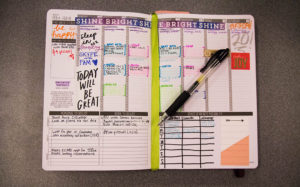
I once typed a four page paper on my phone from the break room of a Downtown Crossing retail shop over the course of a nine hour shift. I’ve copy-pasted long, important class readings into the Notes app on my iPhone, and hit “Select All” so Siri could read the text to me in her stilted voice while I weaved through Boston streets. I’ve pushed through a week of work with two hours of sleep per night, and lived exclusively off instant oatmeal for multiple days between paychecks. These scenarios I encountered in my almost four years at Emerson are likely familiar to plenty of my peers. Sometimes a to-do list feels heavy enough to drown you. To keep yourself afloat, you have to let go of some of that weight. You can’t accomplish your goals if you let yourself sink.
Students today face immense pressure to reach a vague idea of success. But as opinion editor Abigail Hadfield wrote last week, the tools we use to measure our achievements aren’t always the most accurate. Coupled with the urge to come out on top is the reality that the average 2016 college graduate finished with $37,172 in student loan debt. With the over $40,000 Emerson bills for tuition each year, I’m personally thousands more in the hole—and I’m certainly not alone. Parents consistently pay less toward their children’s tuition each year, and it’s difficult to find rent near Emerson’s campus under $800/month. When you can hardly keep a double digit number in your bank account, making the Dean’s List and prepping a resume at the same time seems unthinkable.
Balancing class, work, and extracurriculars requires planning and open communication. Budget your income and when you do homework, attend meetings, and fulfill basic necessities: sleep, eat, shower, socialize. Don’t feel bad for taking care of yourself instead of chipping at your to-do list. When you don’t fulfill your needs first, you will hit a physical or emotional wall that could put you out of service for multiple days—a consequence way worse than losing an hour of homework time for a nap or to cry to a loved one over FaceTime. When you feel like something’s not going to work out, warn whoever is impacted—a professor, a boss, a friend—in advance. In ensuring your mental and physical health, you may not get to complete your collegiate master plan. But you will not burn out. And survival is its own kind of success.
When I look back on my Quaker diet and marathon retail shifts, I can’t help but feel a little bit impressed with myself. I’m proud I made it through. But it’s a short slide from pride to superiority, especially when we can never completely know the circumstances of those around us. Placing value in a packed schedule promotes unhealthy behavior—none of us should strive to struggle.
All the bullet journals, Moleskine planners, and Google Calendar notifications in the world can’t ensure you’ll slay an impossible schedule. So take the B- in the Gen-Ed course and call out of work when exhaustion pins you to your bed. Stay as rested, nourished, and clean as possible. And when things don’t fall perfectly into place, don’t beat yourself up. Your Orientation dreams may not come true. As you learn new things, those aspirations often change.
Barely any of my friends graduating with me are going directly into their major field. Personally, I’ll be using my journalism degree come September to teach English in a public school. That wasn’t part of my plan, and it’s not what I spent the past few years directly working toward. But all the unexpected experiences I’ve had in the past few years led me here, and I’m so excited to see what the future holds.